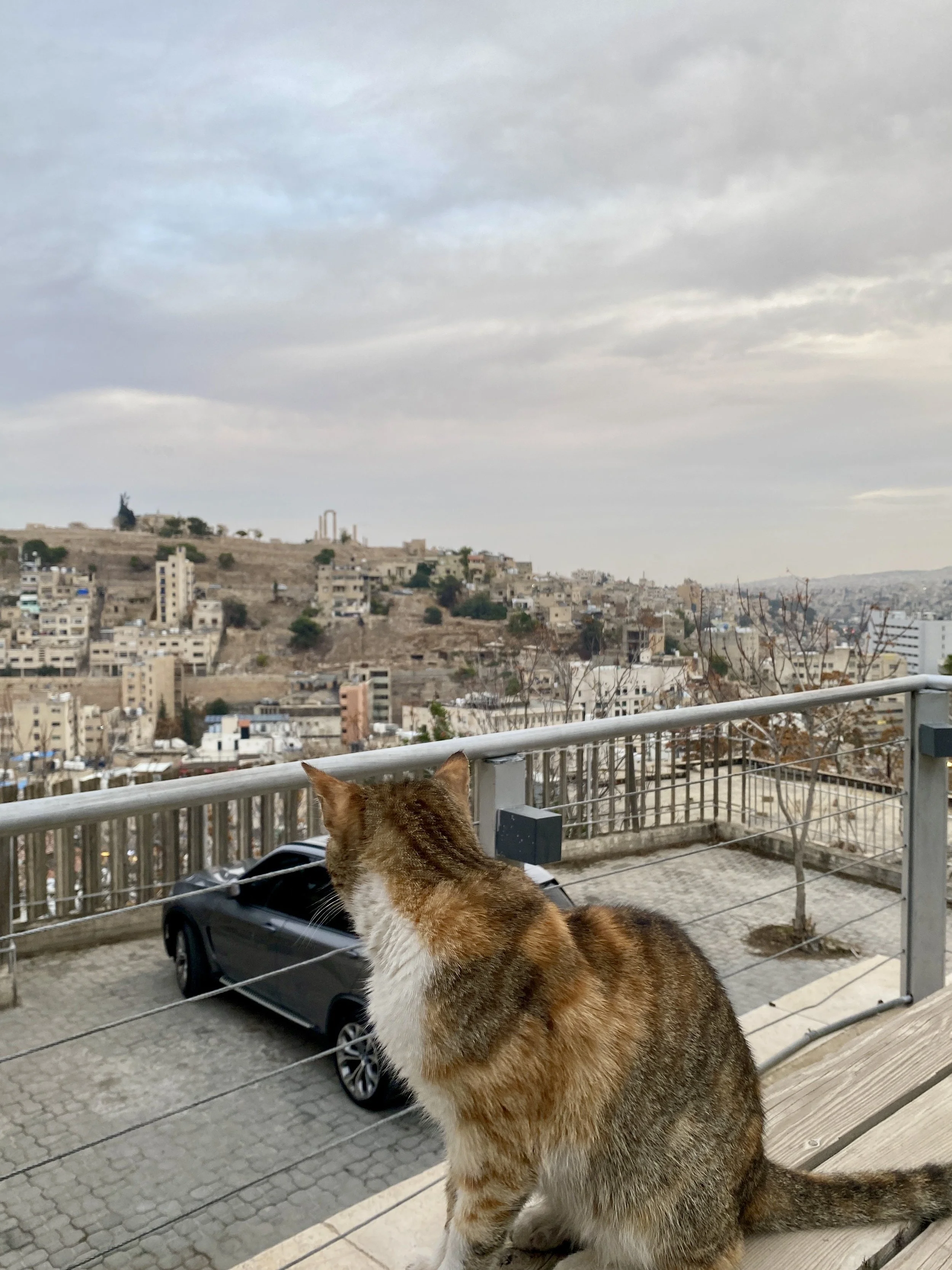"What Do I Do Now? How to Avoid and Deal with Sexual Harassment While Abroad" by Xenia Makosky
You can probably already tell from the title of this blog that I picked a difficult topic for today’s blog. I know that harassment, especially for women, might not be the easiest topic to talk about, but the more we talk about it and condemn it, the better for society.
Studying abroad in Amman is the first time I have ever truly been alone in the world without my family close by, and it is also the first time I have lived in a city. I have loved everything about my time in Jordan and for the most part 99% of Jordanians that I have met and interacted with are incredibly kind and welcoming people, but like everywhere else in the world, there are also some “not so friendly” people here too, and harassment does occur. While I have, thankfully, never been in serious physical danger, harassment can be unsettling and scary at times, and it can be hard in the moment to know what to do. Below is a list of ways to avoid harassment, escape harassment, and Arabic words to help you find help. This is a completely honest blog that I wish I would have had before I studied abroad, so I hope that my advice and techniques can benefit future students who might encounter uncomfortable situations.
Before I give you these lists, however, I just want to note two very important things.
It is really important to note that harassment is not unique to just Jordan or the Arab world. Harassment can happen to anybody, anywhere in the world, and it is especially common in cities, even in the United States. Students studying abroad, however, might encounter harassment more because we are on our own exploring most of the time, and we are foreigners.
There’s a difference between hospitality and kindness in Jordanian culture versus creepy behavior. Jordanians, in general, are extremely friendly people, and are extremely hospitable. Sometimes their behavior might come off as strange from an American perspective, but in Jordanian culture they are just being generous. For example, maybe a man in a coffee shop gives you a free pastry or an employee gives you a small gift when you purchase something. This is not considered harassment. Don’t automatically assume the worst of a stranger.
Some tips to help avoid harassment:
Wait in a crowded busy private area, like a cafe or store, for taxis, if possible
While it might not always be possible to wait in a busy private area, if you have the option to wait inside, I recommend doing it. If you cannot wait inside, then at least try to wait in a group of people on the street. If you have a man with you, ask if he can wait with you until your taxi arrives. If possible, try to allow women to get their taxis/ transportation home first. Men are less likely to face street harassment than young women, and having a male companion wait on the street with a young woman can help ward off harassers. If you do not have a man with you and you are in a group of women, then consider taking one taxi and making multiple stops on the way home so nobody is waiting on a street, especially at night, by themselves.
Try to avoid walking at night, especially by yourself
While Amman is a fun city to explore, some areas are not well lit. While you can and definitely should see the city at night, try to pick a location to meet your friends and always be aware of your surroundings. If you want to explore at night, just make sure to have someone else with you.
Never give out your phone number to anybody or personal information
I know this sounds obvious, but some harassers will ask for your phone number and social media platform, and you might feel pressured into giving your information. It is not rude to tell a harasser that it is none of his business and refuse to give information. In this situation it is also okay to lie. Just start making up information about where you are living and studying if the harasser cannot be ignored. A lot of harassers will also ask if you are married. Again, you can always say, “It is none of your business,” or you can also lie and say that you are married.
Dress modestly
While dressing modestly does not always deter harassers, wearing short skirts and sleeveless and low-cut tops will draw attention to yourself. One of my friends who spent a semester abroad in Jordan was harassed no matter what she wore, so she decided to wear a hijab when she was in some parts of the city. While, of course, hijabi women can also face harassment and the veil is not immunity, this technique worked well for her, and she felt she attracted less attention.
Speak in Arabic when possible
A lot of harassers bother foreign women because they are foreigners. You should always try to speak Arabic whenever possible while abroad to practice your Arabic but speaking Arabic will help you better blend in with the local population.
Trust your gut
If you ever even feel like you are in a dangerous situation and your safety is threatened, then you are probably right. Do not doubt your intuition.
You might have done everything you possibly could do to ward off attention, but harassment can still happen. The most important thing to remember is that it is NEVER your fault for being harassed. There is absolutely nothing you should feel guilty about. It is never ever the victim's fault. Here are some ways to deal with harassment if it happens to you.
Strategies to use if you encounter harassment:
Call Amideast emergency phone if you are ever worried about your safety
This is perhaps the most important tip. If you ever feel like you are physically in danger and you cannot navigate your situation, call Amideast immediately. They are there to help you and can get you help.
Ignore catcalls or people calling for your attention.
It can be easy to lose your temper or yell at the harasser, but I recommend trying to ignore the harassment if possible. It might feel rude if someone is calling after you and you keep walking, but trust me, your safety is much more important than responding to a random man on the street. Usually, harassers are trying to get a reaction out of you too, so the less you react the better. If they continue to follow you, however, and your silence is not effective, then try one of the following strategies.
Continue to ignore the harasser and find a store, cafe, restaurant, or business
If you are in an area where there are people and stores and restaurants, I would recommend going into a store and shopping for a bit or getting a drink. When I was in Aqaba a strange man followed me and my friends, and we went into a nearby cafe and told the staff about the harasser. He was not allowed to enter the cafe and after waiting outside for a while he lost interest and went away.
Continue to ignore the harasser and find a bystander
If you go into a cafe or store and the harasser is still bothering you, then it is a good idea to use some of the words I listed below to describe the situation to another person. For example, when a man was following me, I walked up to a Jordanian family, I explained my situation to them, and asked to sit with them. They agreed without hesitation, and the harasser immediately backed off when he saw me approaching others. When possible try to find a bystander.
Talk to Amideast and your host family
While it might feel embarrassing or unnecessary to talk about what happened, I feel better after talking to others about harassment. As I said above, harassment is never the victim’s fault, and you should never feel guilty or embarrassed by someone else’s inappropriate behavior. Depending on whether you were able to get a license plate number or any information about the harasser, you might also be able to report him to the police.
Arabic terms to know to ask for help:
Knowing some Arabic words and expressions can be helpful to get help from bystanders and describe your situation. Below are a few words and expressions that might be helpful. These verbs are all in Amiyya.
السلوك/ التصرف — behavior
الاهتمام — attention
مش مناسب — Not appropriate
الشرطة — Police
المساعدة — Help
في الشارع — In the street
وار — behind
قدام — in front
جنب / جمب — beside
هناك — over there
التحرش — Harassment
متحرش/ين — Harasser/Harassers
ما بدي — I do not want
رفض/ برفض — to refuse
صرخ/ بصرخ — to scream/ shout
لمس/ بلمس — to touch
اتبع/ بتبع — to follow
مشى/ بمشي — to walk
استمر/ بستمر — to continue
حل عني — leave me alone
-
“Excuse me, there is a strange man that is trying to talk with me and is following me. Help me.” You can substitute any of the verbs above into this sentence.
-
“Help me!”
-
“Please stop.” I recommend using this and holding up your hand in front of your chest in the universal “stop” signal.
-
"I will call the police.” Take out your phone and start dialing. You can call the actual police or the Amideast emergency number or even your host parents, if you feel you are in real danger. Usually, this scares the harasser off.
Xenia Makosky is a student from Dickinson College participating on Amideast’s Area and Arabic Language Studies program in Amman, Jordan in Fall 2022.






